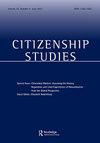为健康的政治制定公民身份
IF 1.9
3区 社会学
Q3 POLITICAL SCIENCE
引用次数: 1
摘要
摘要在20世纪末“意识形态终结”的预言之后,民族主义意识形态和话语被证明具有惊人的韧性,依赖民族主义获得合法性和权力的威权政权也是如此。与此同时,所谓的自由主义政治哲学家和理论家声称对权利和正义的承诺,他们的论点以牺牲法治为代价,激发了民族主义的主观主义。这篇文章解释了即使是那些批评民族主义独裁政权的人,也是如何使用一个词汇来重振雅克·德里达的“主权野兽”的。Miguel de Cervantes和Franz Kafka的见解被用来放大Engine-Isin的及时(如果不是紧急的话)论点,代表着将公民身份理论化为创造性、创新性和自主性的法令,而不是从成员身份中获得的地位。柏拉图关于正义和“健康政治”的观点,以及现有政府内部创造力的例子都得到了阐述,以进一步强调为公民理论化新剧本比为政府提出新理论的好处。本文章由计算机程序翻译,如有差异,请以英文原文为准。
Enacting citizenship for the healthy politeia
ABSTRACT In the wake of ‘end of ideology’ predictions of the late twentieth century, nationalist ideologies and discourses have proven strikingly resilient, as have authoritarian regimes relying on nationalism for their legitimacy and power. Meanwhile, so-called liberal political philosophers and theorists who claim commitments to rights and justice make arguments that invigorate nationalist subjectivities at the expense of the rule of law. This essay explains how even those who are critical of nationalist, authoritarian regimes nonetheless use a vocabulary that reinvigorates Jacques Derrida’s ‘sovereign beast’. Insights from Miguel de Cervantes and Franz Kafka are used to amplify Engin Isin’s timely if not urgent arguments on behalf of theorizing citizenship as enactments that are creative, innovative, and autonomous, and not as a status derived from membership. Plato’s views on justice and the ‘healthy politeia’, as well as examples of creativity within existing governments are elucidated to further emphasize the benefits of theorizing new scripts for citizens over proposing new theories for governments.
求助全文
通过发布文献求助,成功后即可免费获取论文全文。
去求助
来源期刊

Citizenship Studies
POLITICAL SCIENCE-
CiteScore
3.60
自引率
11.10%
发文量
85
期刊介绍:
Citizenship Studies publishes internationally recognised scholarly work on contemporary issues in citizenship, human rights and democratic processes from an interdisciplinary perspective covering the fields of politics, sociology, history and cultural studies. It seeks to lead an international debate on the academic analysis of citizenship, and also aims to cross the division between internal and academic and external public debate. The journal focuses on debates that move beyond conventional notions of citizenship, and treats citizenship as a strategic concept that is central in the analysis of identity, participation, empowerment, human rights and the public interest.
 求助内容:
求助内容: 应助结果提醒方式:
应助结果提醒方式:


